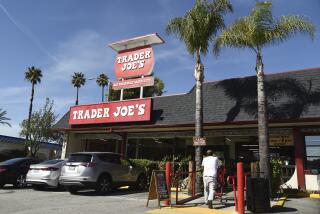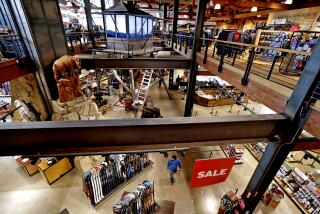REI to Open S.D. Store : Sports Co-Op Mixes Business, Philosophy
- Share via
Seattle-based REI Inc., which will open a store in San Diego this fall, might be the only sporting goods retailer where the profit motive regularly takes a back seat to philosophy.
To be sure, REI is in business to sell sporting goods and apparel to outdoor enthusiasts. The San Diego store will be the 19th location for the 50-year-old company that didn’t get around to adding its second store until 1975. REI’s five-year plan calls for the addition of two or three more stores annually.
Revenue from REI’s retail and catalogue operations has doubled every five years since 1960, and the Seattle-based company expects that sales will reach $325 million during the early 1990s, up from $156.7 million during 1987, according to President Wally Smith.
But set the financial data aside and it becomes readily apparent that REI is not your typical retailing operation. To start with, REI has no shareholders. Rather, it is the nation’s largest consumer-owned cooperative, with 2 million members. An “active” core of nearly 800,000 members has made purchases during the past year.
‘Truly a Success Story’
“REI truly is a success story . . . given its growth and the fact that it’s been around for 50 years,” said Lita Mach, spokeswoman for the Washington-based National Cooperative Business Assn., a 71-year-old trade organization. “They just opened a store (in suburban Washington, D.C.) and I was astounded to hear the 2 million figure.”
REI’s bylaws require that a majority of pretax profit be returned to members in the form of a dividend based on individual members’ annual purchases. Of the company’s income before dividends and taxes totaling $13 million, a record $9.1 million was returned to members in the form of dividends during 1987.
The cooperative’s bylaws also dictate that at least 1% of pretax profits be turned over to environmental and social projects. In recent years, REI has donated more than $1 million of its gross profits to a several conservation-minded organizations.
The paradox of running a cooperative that competes head-to-head with mainstream businesses has not been lost on REI’s management team.
REI’s charter, for example, prohibits it from selling goods that are not directly tied to “muscle-powered sports.” Consequently, REI has not added computer sales--even though its demographics strongly suggest that many of the cooperative’s members are in the market for computers, a company spokesman said.
The cooperatives’ charter has in the past set REI’s professional managers at odds with their loyal and sometimes vocal shopper/owners.
“All the difficulties which beset the co-op (in recent years) sprang from the idealism of its beginnings,” according to a long-time REI observer who was quoted in a recently published book that REI commissioned as part of its 50th anniversary celebration.
‘Orgy of Democracy’
That book also warned that many co-ops “self destruct in ‘an orgy of democracy.’ ” And, it underscored the importance of a board of directors that has the power to make significant decisions without first polling the membership. The specter of a powerful board of directors alienated a dissident group during the late 1970s and early 1980s, when REI was trying to create systems that could control the cooperative’s rapid growth.
The dissidents wanted major changes, including referendums on key capital and operating decisions such as the addition of stores and executive pay packages. A worried board member predicted that the demands would “tie REI in knots,” according to the REI history book. Board members cautioned members that “direct democracy had plunged other co-ops into the maelstrom,” according to the book.
The dissidents eventually were defeated: Only one of four opposition candidates was elected to the board, and the question of referendums was set aside.
At the start of the 1980s, there was good reason to wonder if a cooperative that was limited to selling “muscle-powered” sporting goods would be around at decade’s end.
“REI represents a pretty interesting turnaround,” according to John Horan, publisher of a Yardley-based newsletter that tracks the sporting-goods industry. “Not that long ago they were a co-op that was being run by the ‘bark-eating’ contingent.”
One key to REI’s success was the addition of former Sears executive Jerry Horn in 1979. REI’s history book credits Horn with teaching other executives “how things are done at Sears, Roebuck.”
Horn gave REI a handle on purchasing and inventory before leaving to join another company in 1983, according to Smith, who had been an REI employee since 1965.
Horn’s arrival “ruffled the bark-eaters’ feathers,” quipped Horan. But it also turned the co-op into a business that could manage the explosive growth that REI has enjoyed since the 1960s.
Under Smith, REI has continued its “fairly conservative” business practices. It has funded the opening of all its new stores, including San Diego, through retained earnings. Until two years ago, REI had never utilized long-term debt to finance expansion. But, in 1986, the board voted to borrow $7 million in order to build a headquarters building. That debt was deemed acceptable only because leasing was a more expensive option, Smith said.
First East Coast Stores
REI remains very much a co-op, according to Smith, but its stores and catalogue operation, which accounts for 20% of revenue, are open to non-members. The $10 membership fee, which generated $1.6 million during 1987 and a record $1.9 million in 1986, entitles shoppers to a share of the annual dividend.
REI earlier this year opened its third store in Washington State. The San Diego store joins other Southern California stores in Carson (which opened in 1977), Orange (1982) and San Dimas (1986). REI has about 180,000 members in Southern California, including about 6,000 in San Diego.
Last year, REI opened its first East Coast stores, in suburban Washington and Boston. “We intend to be in Chicago and New York, eventually,” according to Smith. “The Southwest is also attractive. Sooner or later we want to be in all the major metropolitan areas.” Smith said the cooperative recently signed an agreement to open a store in Phoenix.
REI has witnessed an explosion in competition, from general sporting goods chains such as Oshman’s and Big 5 as well as more direct competitors such as San Diego-based Adventure 16 and La Canada-based Sport Chalet.
Overall camping and outdoor equipment sales are expected to increase slightly, to $901 million during 1988, up from $857.5 million during 1987, according to the Chicago-based National Sporting Goods Assn.
REI has protected its market share by “always having real expertise in its sales help,” according to Horan. “And, they’ve kept a real good eye on value. They don’t try to (sell customers) with a lot of jazz.”
More to Read
Inside the business of entertainment
The Wide Shot brings you news, analysis and insights on everything from streaming wars to production — and what it all means for the future.
You may occasionally receive promotional content from the Los Angeles Times.










